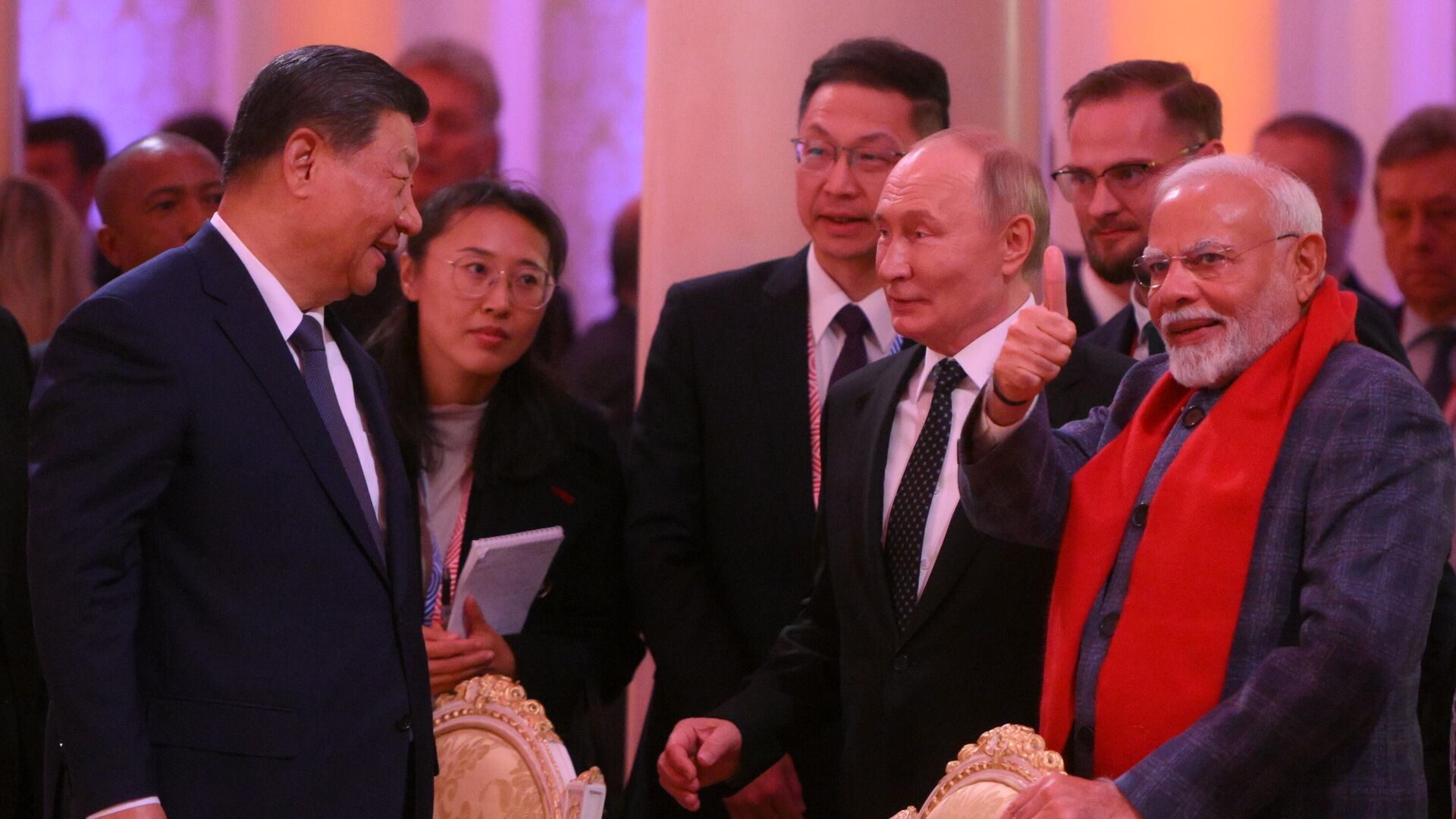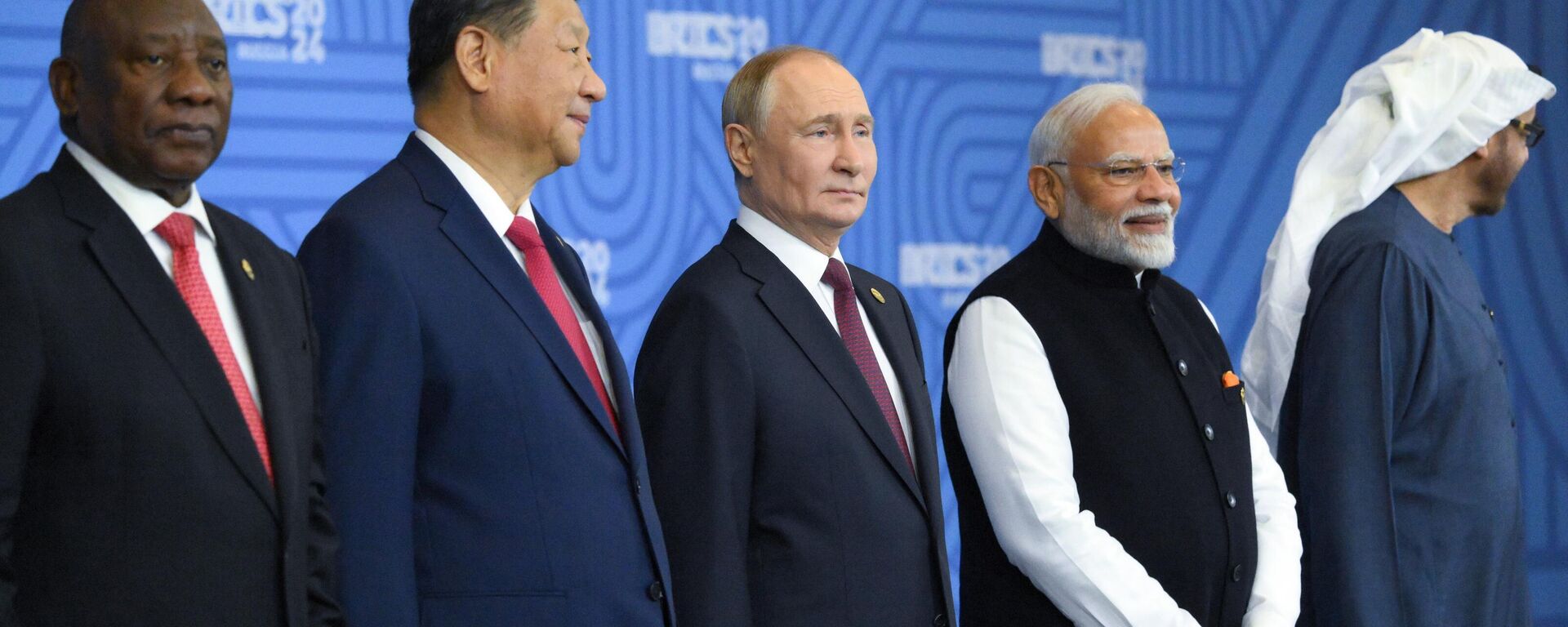https://sputniknews.in/20241026/what-can-brics-provide-to-global-south-8327523.html
What Can BRICS+ Provide to Global South?
What Can BRICS+ Provide to Global South?
Sputnik India
The Western-led global order is becoming increasingly outdated and irrelevant, experts say, as it fails to address complex global challenges. This order... 26.10.2024, Sputnik India
2024-10-26T18:48+0530
2024-10-26T18:48+0530
2024-10-26T18:48+0530
sputnik opinion
brics
brics summit 2024
kazan brics summit
russia
global south
collective west
western sanctions
un security council (unsc)
un reform
https://cdn1.img.sputniknews.in/img/07e8/0a/17/8318355_0:0:2977:1676_1920x0_80_0_0_1821f2c71053f0ddac08fc70f86794ca.jpg
The lack of representation for countries like India in institutions such as the UNSC is an anomaly. In response, alternative non-Western groupings like BRICS provide a platform based on mutual respect and shared interests, attracting interest from over three dozen countries, Anil Trigunayat, former Ambassador to Jordan Libya & Malta, told Sputnik India."BRICS+, representing emerging economies, prioritizes the welfare of the developing world and the Global South. The unilateral and one-size-fits-all approaches of Bretton Woods and other Western institutions have failed to meet these nations' needs," the former ambassador explained.Growing dissatisfaction with Western-led institutional, economic, and global governance models is apparent, as nations increasingly demand inclusiveness, transparency, and equity — needs unmet by most existing multilateral forums. BRICS aims to address this gap, Dr. Pooja Bhatt, associate professor at the Jindal School of International Affairs, JGU, told Sputnik India."India, with BRICS Plus' cooperative mechanisms, must aim to offer mutually beneficial and sustainable global solutions, rather than allowing it to devolve into another unproductive, anti-Western institution," Dr. Bhatt explained.Influence of Southern countries within the prevailing international system, largely shaped by Western powers — particularly through frameworks like the Bretton Woods system — remains significantly constrained, said Linjie Chou Zanadu, an associate with the BRICS Policy Centre.The paradigm established by the Anglo-Saxon nations has historically shaped a worldview that views other regions primarily as sources for resource extraction. This perspective has played a significant role in creating the current imbalances in global development. Such an outlook perpetuates inequalities and hinders the possibility of a more equitable and collaborative global framework, he expressed.This disparity underscores the need to leverage the strengths of emerging economies within BRICS, which holds significant potential. By fully harnessing this potential and fostering partnerships, we can establish a more balanced and equitable global framework that benefits all regions, he concluded.
https://sputniknews.in/20241024/nations-look-up-to-brics-frustrated-by-western-financial-institutions-8318518.html
russia
global south
Sputnik India
feedback.hindi@sputniknews.com
+74956456601
MIA „Rossiya Segodnya“
2024
Muhammad Sharif
https://cdn1.img.sputniknews.in/img/07e7/0b/05/5257054_0:0:443:444_100x100_80_0_0_b8bd2af32be62a6eecdb4a84c7fd978f.jpg
Muhammad Sharif
https://cdn1.img.sputniknews.in/img/07e7/0b/05/5257054_0:0:443:444_100x100_80_0_0_b8bd2af32be62a6eecdb4a84c7fd978f.jpg
News
en_IN
Sputnik India
feedback.hindi@sputniknews.com
+74956456601
MIA „Rossiya Segodnya“
Sputnik India
feedback.hindi@sputniknews.com
+74956456601
MIA „Rossiya Segodnya“
Muhammad Sharif
https://cdn1.img.sputniknews.in/img/07e7/0b/05/5257054_0:0:443:444_100x100_80_0_0_b8bd2af32be62a6eecdb4a84c7fd978f.jpg
brics, brics summit 2024, kazan brics summit , russia, global south, collective west, western sanctions, un security council (unsc), un reform
brics, brics summit 2024, kazan brics summit , russia, global south, collective west, western sanctions, un security council (unsc), un reform
What Can BRICS+ Provide to Global South?
The Western-led global order is becoming increasingly outdated and irrelevant, experts say, as it fails to address complex global challenges. This order overlooks the shifting global landscape and the economic rise of the Global South.
The lack of representation for countries like India in institutions such as the UNSC is an anomaly. In response, alternative non-Western groupings like BRICS provide a platform based on mutual respect and shared interests, attracting interest from over three dozen countries, Anil Trigunayat, former Ambassador to Jordan Libya & Malta, told Sputnik India.
"BRICS+, representing emerging economies, prioritizes the welfare of the developing world and the Global South. The unilateral and one-size-fits-all approaches of Bretton Woods and other Western institutions have failed to meet these nations' needs," the former ambassador explained.
"BRICS must promote internal and external reforms while establishing alternative institutions resilient against unilateral sanctions. Ensuring food and energy security is essential for advancing the development goals of the Global South, which requires trust among BRICS members," he added.
Growing
dissatisfaction with Western-led institutional, economic, and global governance models is apparent, as nations increasingly demand inclusiveness, transparency, and equity — needs unmet by most existing multilateral forums. BRICS aims to address this gap,
Dr. Pooja Bhatt, associate professor at the Jindal School of International Affairs, JGU, told Sputnik India.
Despite becoming the largest producers and consumers for the Global North, Global South nations continue to feel underrepresented in Western-led financial institutions. Solidarity is growing among these nations, which are voicing their concerns over the current system, Dr. Bhatt noted.
"India, with BRICS Plus' cooperative mechanisms, must aim to offer mutually beneficial and sustainable global solutions, rather than allowing it to devolve into another unproductive, anti-Western institution," Dr. Bhatt explained.
Influence of Southern countries within the prevailing international system, largely shaped by Western powers — particularly through frameworks like the Bretton Woods system — remains significantly constrained, said Linjie Chou Zanadu, an associate with the BRICS Policy Centre.
The paradigm established by the Anglo-Saxon nations has historically shaped a worldview that views other regions primarily as sources for resource extraction. This perspective has played a significant role in creating the current imbalances in global development. Such an outlook perpetuates inequalities and hinders the possibility of a more equitable and collaborative global framework, he expressed.
"To enhance our ability to effectively manage the complexities of the global system, it is crucial to recognize this as a primary necessity. A nuanced understanding reveals that Europe and the United States possess a wealth of experience that often surpasses that of many countries in the Global South," Mr. Zanadu stressed.
This disparity underscores the need to leverage the strengths of emerging economies within
BRICS, which holds significant potential. By fully harnessing this potential and fostering partnerships, we can establish a more balanced and equitable global framework that benefits all regions, he concluded.



